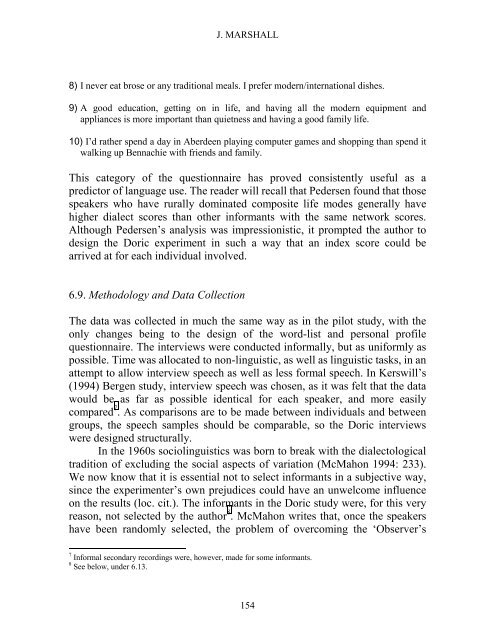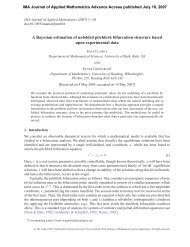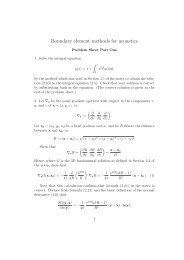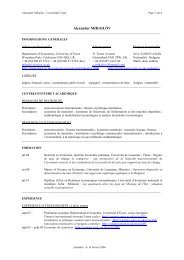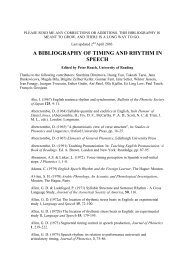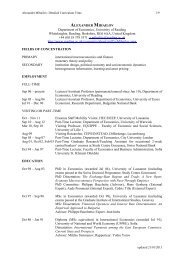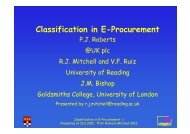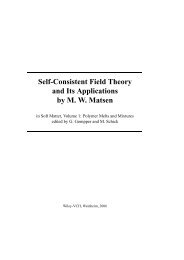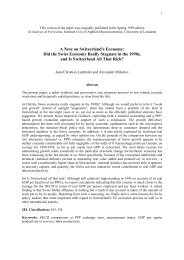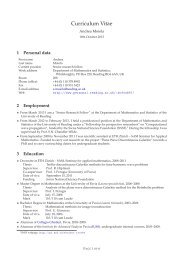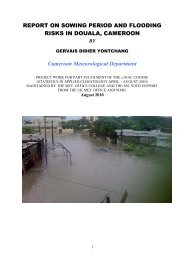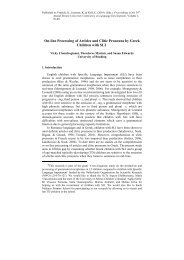Reading Working Papers in Linguistics 4 (2000) - The University of ...
Reading Working Papers in Linguistics 4 (2000) - The University of ...
Reading Working Papers in Linguistics 4 (2000) - The University of ...
Create successful ePaper yourself
Turn your PDF publications into a flip-book with our unique Google optimized e-Paper software.
J. MARSHALL<br />
8) I never eat brose or any traditional meals. I prefer modern/<strong>in</strong>ternational dishes.<br />
9) A good education, gett<strong>in</strong>g on <strong>in</strong> life, and hav<strong>in</strong>g all the modern equipment and<br />
appliances is more important than quietness and hav<strong>in</strong>g a good family life.<br />
10) I’d rather spend a day <strong>in</strong> Aberdeen play<strong>in</strong>g computer games and shopp<strong>in</strong>g than spend it<br />
walk<strong>in</strong>g up Bennachie with friends and family.<br />
This category <strong>of</strong> the questionnaire has proved consistently useful as a<br />
predictor <strong>of</strong> language use. <strong>The</strong> reader will recall that Pedersen found that those<br />
speakers who have rurally dom<strong>in</strong>ated composite life modes generally have<br />
higher dialect scores than other <strong>in</strong>formants with the same network scores.<br />
Although Pedersen’s analysis was impressionistic, it prompted the author to<br />
design the Doric experiment <strong>in</strong> such a way that an <strong>in</strong>dex score could be<br />
arrived at for each <strong>in</strong>dividual <strong>in</strong>volved.<br />
6.9. Methodology and Data Collection<br />
<strong>The</strong> data was collected <strong>in</strong> much the same way as <strong>in</strong> the pilot study, with the<br />
only changes be<strong>in</strong>g to the design <strong>of</strong> the word-list and personal pr<strong>of</strong>ile<br />
questionnaire. <strong>The</strong> <strong>in</strong>terviews were conducted <strong>in</strong>formally, but as uniformly as<br />
possible. Time was allocated to non-l<strong>in</strong>guistic, as well as l<strong>in</strong>guistic tasks, <strong>in</strong> an<br />
attempt to allow <strong>in</strong>terview speech as well as less formal speech. In Kerswill’s<br />
(1994) Bergen study, <strong>in</strong>terview speech was chosen, as it was felt that the data<br />
would be as far as possible identical for each speaker, and more easily<br />
compared 7 . As comparisons are to be made between <strong>in</strong>dividuals and between<br />
groups, the speech samples should be comparable, so the Doric <strong>in</strong>terviews<br />
were designed structurally.<br />
In the 1960s sociol<strong>in</strong>guistics was born to break with the dialectological<br />
tradition <strong>of</strong> exclud<strong>in</strong>g the social aspects <strong>of</strong> variation (McMahon 1994: 233).<br />
We now know that it is essential not to select <strong>in</strong>formants <strong>in</strong> a subjective way,<br />
s<strong>in</strong>ce the experimenter’s own prejudices could have an unwelcome <strong>in</strong>fluence<br />
on the results (loc. cit.). <strong>The</strong> <strong>in</strong>formants <strong>in</strong> the Doric study were, for this very<br />
reason, not selected by the author 8 . McMahon writes that, once the speakers<br />
have been randomly selected, the problem <strong>of</strong> overcom<strong>in</strong>g the ‘Observer’s<br />
7 Informal secondary record<strong>in</strong>gs were, however, made for some <strong>in</strong>formants.<br />
8 See below, under 6.13.<br />
154


